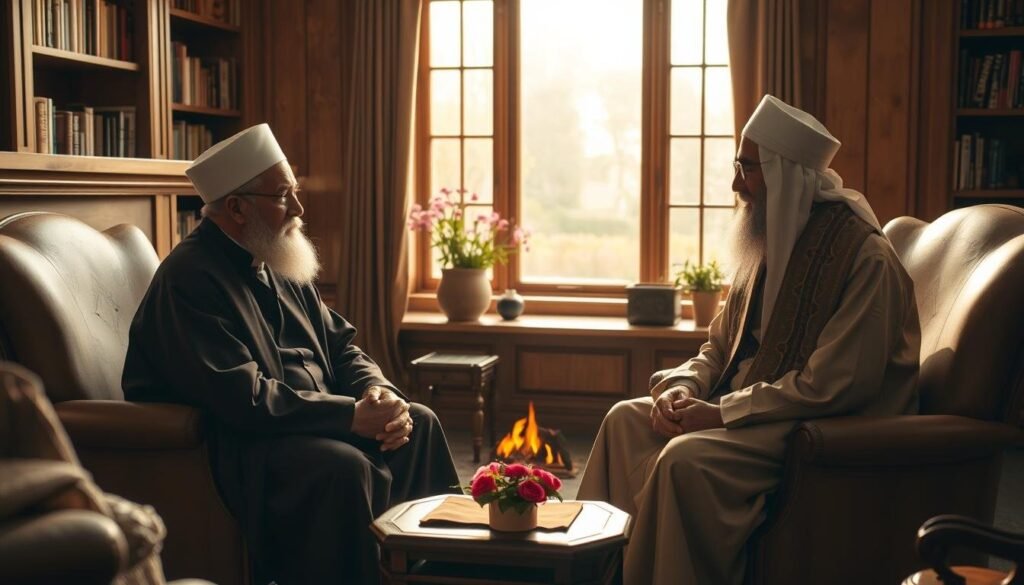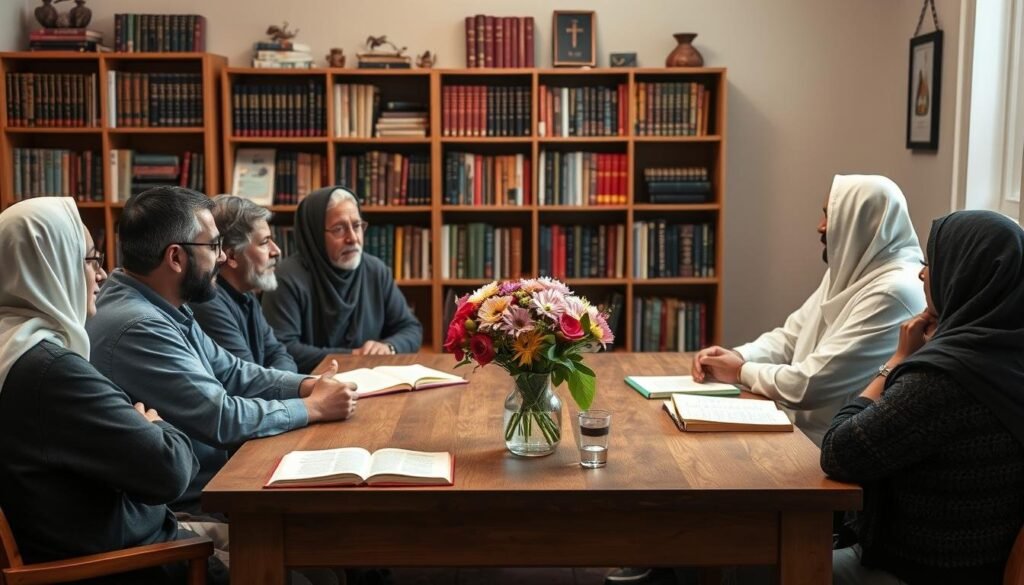Last updated on October 20th, 2025 at 02:23 pm
Is It Possible for a Mormon to Marry a Muslim? Thinking about interfaith marriage between a Mormon and a Muslim can seem tricky. This is because they come from different religious backgrounds.
It’s natural to think about the challenges and chances in such a relationship. Knowing about Mormon marriage beliefs and Islamic marriage traditions is key to understanding these differences.
Looking into an interfaith marriage means considering many things. This includes religious, cultural, and legal aspects. This article will explore these topics. It aims to give you insights into the challenges and ways forward for couples from different faiths.
Contents
- 1 Understanding Mormon Marriage Beliefs
- 2 Islamic Marriage Traditions and Requirements
- 3 Can a Mormon Marry a Muslim? Official Religious Positions
- 4 Theological Differences and Common Ground
- 5 Cultural Challenges in Mormon-Muslim Relationships
- 6 Family Reactions and Community Acceptance
- 7 Legal Considerations for Mormon-Muslim Marriages
- 8 Raising Children in a Mormon-Muslim Household
- 9 Communication Strategies for Interfaith Couples
- 10 Support Resources for Mormon-Muslim Couples
- 11 Real-Life Examples of Mormon-Muslim Marriages
- 12 Conclusion: Is It Possible for a Mormon to Marry a Muslim?
- 13 FAQ
- 13.1 What are the main challenges faced by Mormon-Muslim couples?
- 13.2 Can a Mormon marry a Muslim according to the Mormon Church’s official position?
- 13.3 What are the Islamic views on marrying non-Muslims?
- 13.4 How do Mormon-Muslim couples navigate differences in their faiths?
- 13.5 What are some strategies for interfaith parenting in a Mormon-Muslim household?
- 13.6 Are there support resources available for Mormon-Muslim couples?
- 13.7 What are the legal considerations for Mormon-Muslim marriages?
- 13.8 How can Mormon-Muslim couples build a strong and successful interfaith relationship?
Understanding Mormon Marriage Beliefs
For Mormons, marriage is more than a civil contract. It’s a sacred ordinance. The Mormon faith sees marriage as a key part of one’s spiritual journey. This raises questions about marrying a Muslim. [Is It Possible for a Mormon to Marry a Muslim?]
Mormon marriage ceremonies are unique. They involve special rituals and covenants. These ceremonies take place in temples, which are sacred spaces. The core of Mormon marriage is eternal marriage. This means the couple is sealed together for eternity, not just their mortal lives.
Temple Marriage Sealings
Temple marriage sealings are a key part of Mormon ceremonies. During this ritual, the couple and their children are sealed together. This creates eternal family bonds. It’s believed that this sealing is done by proper authority, keeping the family together beyond mortality.
| Aspect | Description | Significance |
|---|---|---|
| Mormon Marriage Ceremonies | Performed in temples with specific rituals | Sacred ordinance sealing couples for eternity |
| Temple Marriage Sealings | Sealing couples and their children | Creates eternal family bonds |
| Eternal Marriage | Couples sealed for eternity | Ensures family unity beyond mortality |
Understanding these beliefs helps grasp the challenges of a Mormon marrying a Muslim. The eternal nature of Mormon marriages and the importance of temple sealings show the deep commitment involved.
Islamic Marriage Traditions and Requirements
Understanding Islamic marriage traditions is key when looking at interfaith marriages between Mormons and Muslims. In Islam, marriage is a big deal with its own rituals and rules.
The Islamic Nikah ceremony is a key part of getting married in Islam. Nikah means “marriage contract” in Arabic. This ceremony brings together the bride, groom, and their families to make the union official. An Imam or Muslim officiant leads the ceremony, reciting prayers and making sure the contract is done right.
Marriage Contract and Witnesses
A big part of the Nikah ceremony is signing the marriage contract. This contract lists the marriage terms, like the dowry (mahr) the groom gives to the bride. Witnesses are also needed, as Islamic tradition says at least two must be there. They make sure the marriage is known and accepted by the community.
The Islamic marriage contract and the role of witnesses show how important openness and community approval are in Islamic marriages. These practices highlight the religious, social, and family ties formed through marriage. [Is It Possible for a Mormon to Marry a Muslim?]
Can a Mormon Marry a Muslim? Official Religious Positions
Thinking about a marriage between a Mormon and a Muslim? It’s important to know the official views of both faiths. The Mormon Church and Islam have rules about marrying outside their faith. These rules can affect how the couple practices their religion and raises their family.
The Mormon Church, also known as The Church of Jesus Christ of Latter-day Saints, has rules for marrying outside the faith. It encourages members to marry within the faith for eternal bonds. But, it allows marriages to non-Members. Yet, these marriages are not “sealed” in a Mormon temple unless the non-Member is baptized and confirmed.
In Islam, the rules for marrying non-Muslims differ between Sunni and Shia. Generally, Muslim men can marry women from the “People of the Book” (Christians and Jews). But, marrying a Muslim woman is preferred. Non-Muslim women can marry Muslim men if they agree to follow Islamic practices and raise children as Muslims.
For a Mormon-Muslim couple, understanding each other’s faith is key. They must talk openly about their religious practices and how to raise their children. While there are challenges, their love and willingness to find common ground can help them build a strong relationship.
Theological Differences and Common Ground
Mormonism and Islam have their own beliefs, but they also share common ground. This can be the base for a successful marriage between people of different faiths. It’s important to understand these differences and similarities.
Mormonism and Islam have big differences in their beliefs. Mormonism comes from Joseph Smith and the Book of Mormon, focusing on family and exaltation. Islam, based on the Quran and Hadith, emphasizes God’s unity and the prophetic tradition. These beliefs can affect many parts of married life, like worship and family values.

Even with big differences, there are values both faiths share. Family, charity, and moral integrity are important in both Mormonism and Islam. These shared values can be a strong foundation for interfaith dialogue and cooperation.
Having open and respectful talks can help with the challenges of different beliefs. By understanding and valuing both faiths’ unique and shared values, you can build a stronger, more loving relationship. [Is It Possible for a Mormon to Marry a Muslim?]
Remember, the success of an interfaith marriage depends on respect, understanding, and a desire to learn from each other. By embracing both the differences and commonalities, you can have a rich and fulfilling marriage.
Cultural Challenges in Mormon-Muslim Relationships
When a Mormon and a Muslim think about getting married, they face many challenges. These include not just religious differences but also cultural ones. Cultural expectations and practices can be very different, leading to misunderstandings or conflicts.
The cultural scene in a Mormon-Muslim marriage is complex. It’s shaped by the unique cultural backgrounds of both partners. Mormons might follow certain traditions and community practices. Muslims, on the other hand, are guided by Islamic principles.
Dealing with these cultural differences needs a thoughtful and open-minded approach. Couples can learn a lot by understanding each other’s cultural backgrounds. They should also learn about the importance of different practices in their communities.
One way to improve interfaith cultural exchange is through cultural sharing. This can include cooking traditional meals, joining cultural festivals, or celebrating important holidays together.
| Cultural Aspect | Mormon Cultural Practices | Muslim Cultural Practices |
|---|---|---|
| Family Values | Strong emphasis on family unity and support | High regard for family honor and respect |
| Community Involvement | Active participation in church community | Engagement in mosque activities and Islamic community |
| Holiday Celebrations | Celebration of Mormon holidays like Pioneer Day | Observance of Islamic holidays such as Eid al-Fitr |
By understanding and respecting these cultural differences, Mormon-Muslim couples can build a stronger, more inclusive relationship. Embracing the richness of both cultures can make their bond stronger and their home environment more harmonious.
In conclusion, while cultural challenges are inevitable in Mormon-Muslim relationships, they can be overcome. This is through mutual respect, understanding, and a willingness to learn from each other. By doing so, couples can create a positive and enriching interfaith cultural exchange.
Family Reactions and Community Acceptance
Marrying across religious lines, like between a Mormon and a Muslim, can be tough. You might face everything from support to outright opposition. It all depends on how your families and communities react.
Joining each other’s families and communities can be a challenge. It’s key to be understanding and open. Talking about your feelings and values is crucial. [Is It Possible for a Mormon to Marry a Muslim?]
Getting both sides to accept you might seem hard. But, it’s doable. Engaging in interfaith dialogue and attending community events together can help. It builds understanding and acceptance.
Having a strong support network is vital. This could mean finding other interfaith couples or joining groups that promote understanding. It helps you both feel supported.
The success of a Mormon-Muslim marriage depends on family and community support. By tackling issues early and finding common ground, you can overcome differences. This way, you can navigate your diverse backgrounds together.
Legal Considerations for Mormon-Muslim Marriages
When a Mormon and a Muslim plan to marry, they face legal hurdles. Understanding these laws is crucial to make sure their marriage is recognized.
Mormon-Muslim couples must follow the marriage laws in their area. This means getting the right marriage licenses, meeting age and residency rules, and following laws about interfaith marriages.
Here are some key legal considerations:
- Researching and understanding local marriage laws
- Ensuring the marriage ceremony is performed by an authorized officiant
- Registering the marriage with the appropriate authorities
International Marriage Considerations
For couples from different countries, international marriage laws apply. It’s important to know the rules for international marriages. This includes any needed documents, translations, or registrations in their countries.
Couples should talk to legal experts. This ensures they follow all laws. This way, they can make their marriage legally valid. [Is It Possible for a Mormon to Marry a Muslim?]
Raising Children in a Mormon-Muslim Household
Being a parent in a Mormon-Muslim home is a chance to learn about different faiths. You and your partner will face both tough times and great moments. These moments will help decide how to raise your kids.
It’s a mix of two faiths when you raise kids in an interfaith family. You must figure out how to mix the unique aspects of both Mormon and Muslim faiths in your parenting. This includes picking which religious practices, holidays, and values to teach your kids.

- Open communication: Talk often about your beliefs, hopes, and worries with your partner. [Is It Possible for a Mormon to Marry a Muslim?]
- Respect for both faiths: Make sure both Mormon and Muslim traditions are valued and shown in your home.
- Educate your children: Teach your kids about both faiths, focusing on the shared values and principles.
- Joint decision-making: Work together on big choices about your kids’ religious upbringing.
Using these Mormon-Muslim parenting strategies can make a welcoming space for your kids. It’s key to be open to change as your kids grow and form their own beliefs.
Bringing up kids in an interfaith family is a rewarding journey. By embracing both faiths, you give your kids a wide view of faith and its importance in their lives.
Communication Strategies for Interfaith Couples
Being in an interfaith marriage between a Mormon and a Muslim can be complex. Good communication is key to understanding and respecting each other’s beliefs and cultures.
Mormon-Muslim couples should talk openly and honestly. They should discuss their expectations, beliefs, and any concerns about their marriage. Active listening is important; both should try to understand each other without judging.
One big challenge for interfaith couples is solving conflicts caused by their religious differences.
Conflict Resolution in Mormon-Muslim Marriages
- Find the main cause of the conflict to solve it well.
- Make sure both partners feel heard in a respectful way.
- Look for things you both agree on and find compromises.
- Think about getting advice from religious leaders or counselors who know about interfaith marriages.
By using these communication and conflict-solving methods, Mormon-Muslim couples can make their relationship stronger. It’s about finding a balance between their faiths and understanding each other’s needs and beliefs.
Support Resources for Mormon-Muslim Couples
Being in a Mormon-Muslim relationship can be easier with the right support. It’s important to understand and be patient with each other. Getting the right help can make a big difference.
Counseling for Interfaith Couples
Counseling is key for couples from different faiths. It’s a place to talk about what you both believe and how you can work together. Counselors can teach you how to handle disagreements and grow closer.
| Resource Type | Description | Benefits |
|---|---|---|
| Interfaith Support Organizations | Groups that provide support, guidance, and community for interfaith couples. | Access to shared experiences, advice, and networks. |
| Counseling Services | Professional counseling tailored to the needs of interfaith couples. | Conflict resolution, communication improvement. |
| Online Resources | Websites, forums, and online communities offering advice and support. | Convenience, anonymity, and a wide range of perspectives. |
Using these resources can help Mormon-Muslim couples grow stronger together. Seeking support is a sign of strength, not weakness. [Is It Possible for a Mormon to Marry a Muslim?]

For more info on support groups and counseling, check out local community centers, religious groups, and online sites.
Real-Life Examples of Mormon-Muslim Marriages
Real-life stories of Mormon-Muslim marriages show the beauty of love across different cultures and faiths. These tales prove that love and commitment can overcome many obstacles.
A Mormon woman and a Muslim man found love despite their differences. They worked hard to understand each other’s beliefs. This way, they built a loving home together.
Challenges Faced by Mormon-Muslim Couples
Mormon-Muslim couples face many challenges. These include:
- Differences in religious practices and beliefs
- Cultural expectations from their respective communities
- Decisions regarding the religious upbringing of their children
Yet, many couples find ways to overcome these hurdles. Some choose to honor both religions, creating a unique family culture. [Is It Possible for a Mormon to Marry a Muslim?]
These stories show that love and understanding can make Mormon-Muslim marriages work. Couples say their relationship has made them grow and understand others better.
Support from family, friends, and community is key. By embracing differences and finding common ground, couples can build a strong relationship.
Conclusion: Is It Possible for a Mormon to Marry a Muslim?
Exploring Mormon-Muslim marriages shows us the importance of understanding and respect. The path for interfaith couples is not easy, but it’s full of possibilities. With good communication and a desire to learn, they can overcome many obstacles.
A look at Mormon-Muslim marriages shows us that despite differences, there’s room for growth and understanding. By accepting and valuing these differences, couples can build a strong bond. This foundation is key to their relationship’s success.
The future of interfaith relationships is bright, with many couples leading the way. Each interfaith marriage is unique, and what works for one may not work for another. This diversity is what makes interfaith relationships so special. [Is It Possible for a Mormon to Marry a Muslim?]
The success of an interfaith marriage depends on effective communication and mutual respect. By navigating challenges together, couples can create a loving home. This environment is perfect for their children to grow and flourish.
See Also: Can Mormons Marry Non-Mormons?
FAQ
What are the main challenges faced by Mormon-Muslim couples?
Mormon-Muslim couples often face challenges. These include differences in faith, cultural expectations, and family reactions. Understanding and communication are key to overcoming these challenges.
Can a Mormon marry a Muslim according to the Mormon Church’s official position?
The Mormon Church allows its members to marry non-Mormons. However, it encourages them to marry within the faith. The Church’s official position is that marriage to a non-Mormon may require special temple recommend considerations.
What are the Islamic views on marrying non-Muslims?
Islamic views on marrying non-Muslims vary. Some Islamic scholars permit Muslim men to marry women from the “People of the Book” (Christians and Jews). Others have more restrictive views. Muslim women are generally not permitted to marry non-Muslim men.
Mormon-Muslim couples can navigate differences by engaging in open and respectful dialogue. They can seek counseling and find common ground in their shared values.
What are some strategies for interfaith parenting in a Mormon-Muslim household?
Strategies for interfaith parenting include discussing and agreeing on the religious upbringing of children. Exposing them to both faiths is also important. Teaching them about the values and principles of both Mormonism and Islam is key.
Are there support resources available for Mormon-Muslim couples?
Yes, there are support resources available. These include interfaith support organizations, counseling services, and online forums. Mormon-Muslim couples can connect with others who share similar experiences. [Is It Possible for a Mormon to Marry a Muslim?]
What are the legal considerations for Mormon-Muslim marriages?
Mormon-Muslim couples should be aware of the legal requirements for marriage in their jurisdiction. They need to obtain necessary licenses and certificates. Ensuring that their marriage is legally recognized is important.
How can Mormon-Muslim couples build a strong and successful interfaith relationship?
Building a strong and successful interfaith relationship requires effort, understanding, and commitment. Effective communication, mutual respect, and a willingness to learn from each other are essential.

Ramona Pearson is a U.S.-based religious researcher and writer with over 10 years of experience studying Mormon history and beliefs. She is also a practicing Mormon and writes to inform readers with accuracy and balance.

